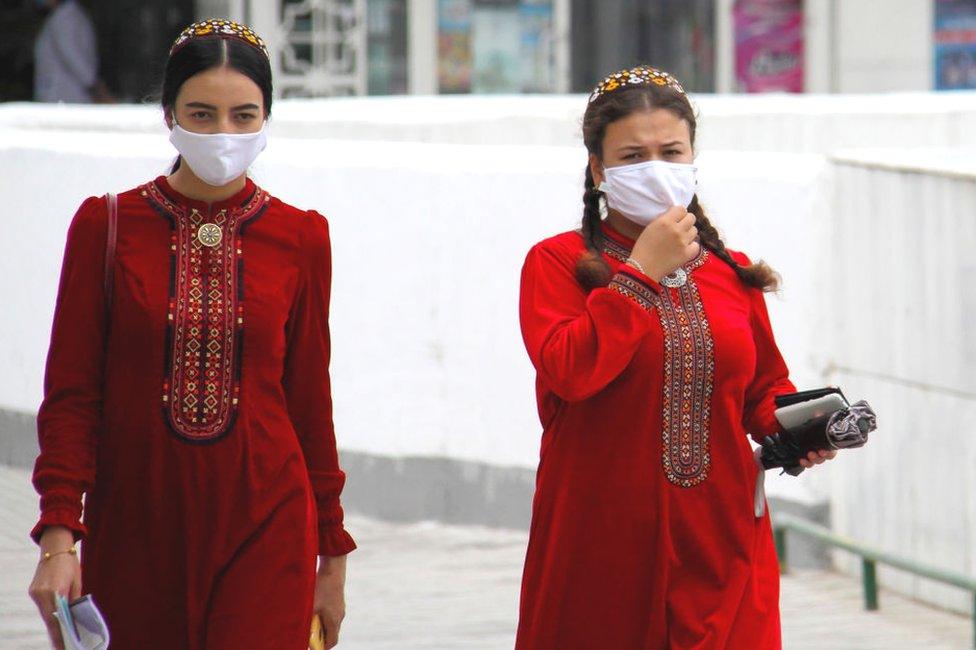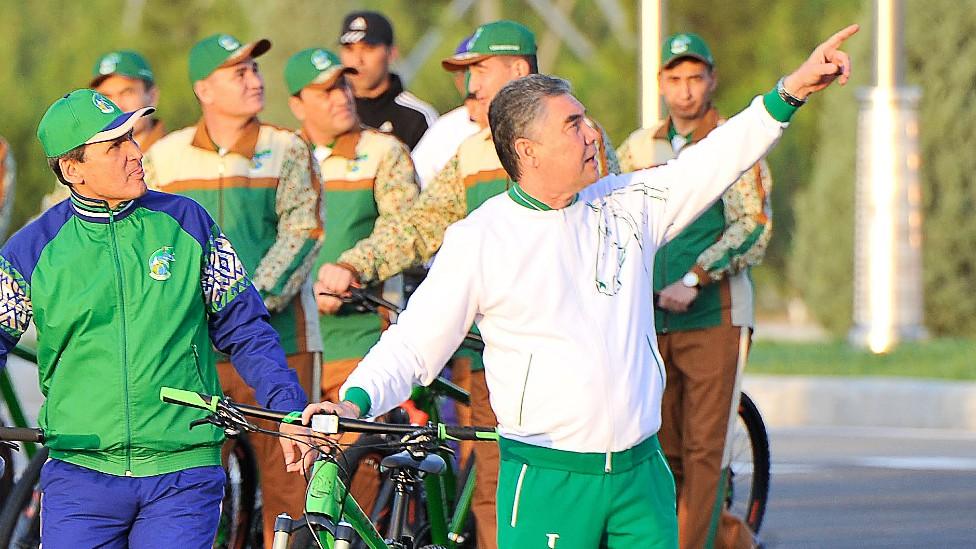WHO casts doubt on Turkmenistan's zero-Covid claim
- Published

Last year, Turkmenistan recommended residents wear masks because of "dust" even as the government insisted there were no cases
A senior World Health Organization official has cast doubt on Turkmenistan's claim that it has zero Covid cases, telling the BBC it is unlikely the virus is not circulating in the country.
"[It] has been spreading worldwide as a pandemic for almost two years now," said Dr Catherine Smallwood, a WHO senior emergencies officer. "From the scientific point of view, it's unlikely that the virus is not circulating in Turkmenistan."
Turkmenistan is one of only a handful of countries, including North Korea, that claim to have no coronavirus cases. Dr Smallwood's comments represent the first public challenge by the WHO to Turkmenistan's claim, as a growing number of Covid cases are being reported in the country informally.
The WHO relies on data provided by national governments to inform its global coronavirus statistics. Until recently, the organisation repeated Turkmenistan's claim that no Covid-19 cases had been registered in the country - drawing criticism from independent observers and media.
Asked if the WHO was now suggesting Turkmenistan was providing false data, Dr Smallwood said the health body could not "call into question whether a country is acting in the spirit of the International Health Regulations" - referring to the legal framework that defines countries' rights and obligations in global public health crises.
Dr Smallwood said it was more important to "build a dialogue" with administrations like President Gurbanguly Berdymukhamedov's, rather than "make statements that may not in fact lead to the type of actions that we would want to see".
Analysts say that Turkmenistan's official statistics on coronavirus are unreliable. One reason was the "extremely repressive, autocratic nature of the government," said Rachel Denber, deputy director of the Europe and Central Asia division at Human Rights Watch.
The Turkmenistan government "has a long history of suppressing data and a long history of punishing people who expose the truth", she said.
A WHO team visited Turkmenistan in July 2020 - the only Covid-19 mission that has been allowed so far. There were some positive signs in the country, Dr Smallwood said - face masks and social distancing requirements had replaced a previous system of fines against those wearing masks, who were accused of "sowing panic". And earlier this year the country became the first to make vaccination mandatory for all adults.
The government was now open to discussing health measures against Covid-19, Dr Smallwood said. "And that's what we focus on because at the end of the day, these are the measures that will contribute to the protection of the population."
But some have questioned this approach, and whether the WHO can help respond to the crisis effectively without reliable statistics like case numbers from the ground.
Aynabat Yaylymova, the founder of saglyk.org, a website that promotes public health literacy in the Turkmen language, said that by remaining silent on case numbers the WHO was "enabling" state propaganda on the pandemic.
"It's not scientific," Ms Yaylymova said. "You can't really deal with the problem if you cannot measure it. And the WHO is supposed to promote science."
Critics have also accused the authorities of manipulating WHO officials and hiding evidence of the pandemic from them during their visit.
The government was "well prepared" for the WHO visit, said Ruslan Myatiev, the editor of the foreign-based Turkmen.news.
"They accurately selected the doctors that the delegation would meet in the country and they took them to the 'right' hospitals and showed them the 'right' patients," he said.
It is not possible to independently verify those claims. In its final report, the WHO mission repeated the government's claim that "no confirmed Covid-19 cases have been registered".
Dr Smallwood told the BBC that the delegation to Turkmenistan "provided very concrete actions that the country could be taking, such as broader use of face masks", and she said the WHO had to take into account that in each country there was "a different context, a different political reality and a different technical capacity to respond".
"The WHO relies on the willing collaboration, communication, and trust with our member states," she said. "We have an open dialogue that we continue to build with our member states and we will continue to do so whatever the circumstances."
Related topics
- Published19 September 2021
